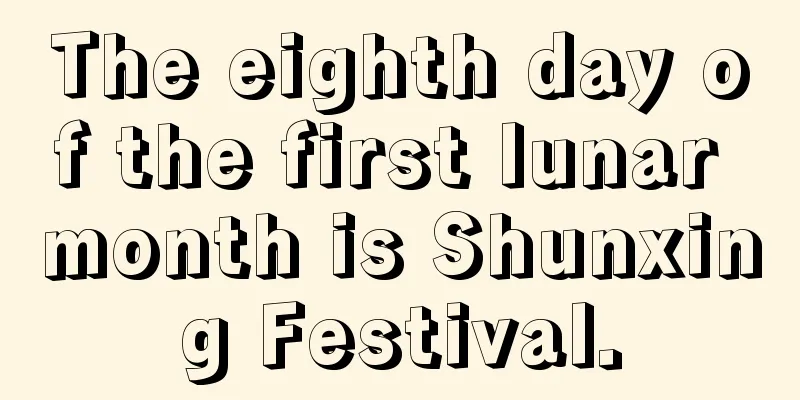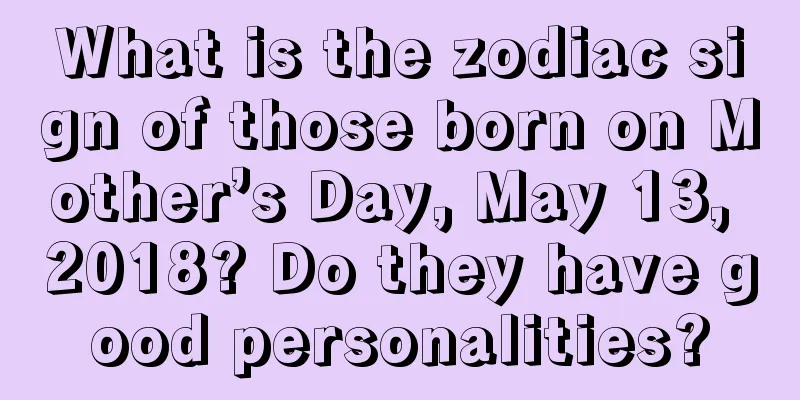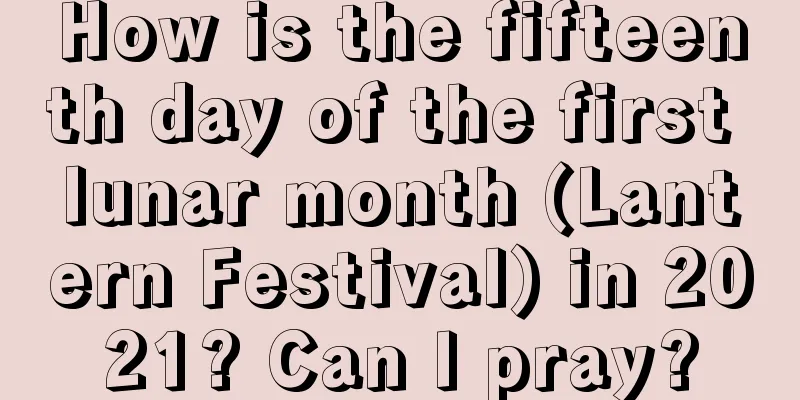The eighth day of the first lunar month is Shunxing Festival.

Introduction: The first month of the lunar calendar is the first month of the Spring Festival, and there are many festivals in this month, and different festivals have different meanings. So, the eighth day of the first lunar month is "Shunxing Festival", what is its meaning? Now, let’s follow the editor to learn about it. A year's plan begins with spring, and the Spring Festival is an important traditional festival of ours. Do you want to know more about the Spring Festival? Come and take a look at the Spring Festival special topic carefully prepared by Mr. Shui Mo!What is Shunxing Festival?The eighth day of the first lunar month is also known as Shunxing Festival, one of the traditional Chinese lunar festivals. The main purpose of this day is to learn about astronomy by reading the names of the stars listed on the star god horse invited from the incense and candle shop. The star worship ceremony of Shunxing Festival is held at night. Rich families put up 108 lanterns, while ordinary families can put up 49 lanterns, and the minimum is 9, representing the nine fortune-telling stars: sun, moon, water, fire, wood, metal, earth, Luo Hou and Ji Du. The lamp bowl is shaped like a small goblet, made of clay or copper, with soybean oil inside, and the wick is made of "lamp flower paper".According to Chinese folklore, the eighth day of the first lunar month is Guzi’s birthday. If the weather is clear on this day, it means a good rice harvest this year; if it is cloudy, it means a poor harvest. Is there any saying about Shunxing Festival?The Chinese people regard the eighth day of the first lunar month as the day when all the stars descend to the earth. They make small lanterns and light them to offer sacrifices to them, which is called Shunxing, also known as "offering sacrifices to the stars" and "receiving the stars".According to Taoism and astrologers, each person has a star in charge every year, also called the "annual star" (the nine stars, namely Sun, Moon, Mercury, Mars, Wood, Venus, Saturn, Luohou and Ketu, take turns to be in charge of the year). A person's fate for the year is entirely controlled by the star in charge of the year. The eighth day of the first lunar month every year is the day when all the star gods gather, and it is also said to be the day when "all the stars descend to the world". Therefore, by offering sacrifices to the star god (i.e. Shunxing) on this day, it is possible to obtain the star god's blessing. Therefore, some people go to the Baiyun Stargazing Temple (also known as the Yuanchen Temple) to burn incense and pray to the stars. But no matter whether one goes to the temple to burn incense or not, on that evening, after all the stars come out in the sky, every family will hold a star-following sacrificial ceremony. Two god codes are used in sacrifice. The first one is printed with Xingke, Suzaku, Xuanwu, etc., and the second one is "Benming Yannian Shouxingjun". The two pieces were put together front and back, clamped on a paper clip, and placed in the middle behind the table in the courtyard for worship. In front of the god's code, there are lamp flowers made of yellow and white lamp paper soaked in fragrant oil, which are placed in a "lamp bowl" with a diameter of about an inch and lit. Then serve cooked Yuanxiao and tea. After dusk, sacrifices are made to the Big Dipper. After the sacrifice, when the remaining lights are about to go out, burn the god code, incense roots, sesame straw, and pine and cypress branches together to complete the sacrifice. Shunxing is also known as Jixing. On the eighth night of the first lunar month, regardless of whether people go to the temple to burn incense and worship the Star God (i.e. Shunxing) or not, after all the stars in the sky come out, each family will hold a Shunxing worship ceremony. After worshiping the "Star God Horse", the housewife will place these lanterns on the desks, kang edges, cabinets in the bedroom, kitchen, and living room, as well as on the steps, corners, and doorways in the courtyard, just like a candlelight party, and it is called "scattered lanterns". At this time, among this mysterious group of lanterns, the elders should tell their children and grandchildren the truth that "time is money" and the importance of "being cautious when alone", because "the stars that shine on one's fate" are always watching everyone's every move, "If you don't want others to know, then don't do it yourself." Scattering lanterns are extremely romantic, allowing you to look forward to and imagine until all the lanterns are burned out. Then, after the whole family says "Happy New Year" to each other, the lights can be turned back on and firecrackers can be set off. The pine branches in the "money basin" in the yard are lit, just like a bonfire, which makes people think of different things. Summary: Through the above article, we have a certain understanding that the eighth day of the first lunar month is the "Shunxing Festival", and we also know that it has a great connection with astrology. I hope you will like the above content. I wish you all good fortune and luck in the new year! After reading this article, there are more exciting content in the Spring Festival special topic, let’s take a look! |
Recommend
Auspicious days for Anmen in April of the lunar calendar in 2022
The fourth month of the lunar calendar is approach...
How are people born in the Great Heat of 2019? Is there any saying about being born on the day of Dashu?
The Great Heat solar term falls around the middle ...
What day is August 26th in the lunar calendar 2019? What month and date is it?
Nowadays, we generally use the Gregorian calendar...
Is the 21st day of the first lunar month in 2018 suitable for funerals? How about the auspiciousness or inauspiciousness of the time?
Humans, like all other creatures in the world, are...
Is it a good idea to pick up the car on the fourth day of May 2019?
May is also known as the Pu month. The most prosp...
Is May 29th of the lunar calendar in 2020 suitable for starting renovations? Is it an auspicious day?
Is May 29th of the lunar calendar in 2020 suitable...
Is April 17th of the lunar calendar in 2019 a suitable date for opening a new store?
The fourth month of the lunar calendar marks the ...
Is it a good idea to move house on the 22nd day of the seventh lunar month in 2018? Can I move into a new home?
The seventh month of the lunar calendar is the ti...
What are the do's and don'ts on the 16th day of the first lunar month in 2018?
What day is the 16th day of the first lunar month...
Is it a good idea to get a haircut on the fourth day of the twelfth lunar month in 2020?
In life, we pay great attention to choosing auspic...
Is the ninth day of the fifth lunar month in 2019 a good day? Is today an auspicious day?
Introduction: Every day of the 365 days in a year ...
2017 July 3rd time auspicious query, time auspicious query
1. What day is the third day of the seventh lunar...
What will the first day of the fifth lunar month in 2021 be like? Is it suitable for travel?
Since ancient times, people like to choose auspici...
What do we eat on the fifteenth day of the first lunar month? Are the delicacies in the north and south the same?
When talking about the Lantern Festival, everyone ...
Is the 23rd day of the lunar calendar in 2018 suitable for signing a contract? When is the auspicious time of the day?
Signing a contract is an indispensable part of bus...









